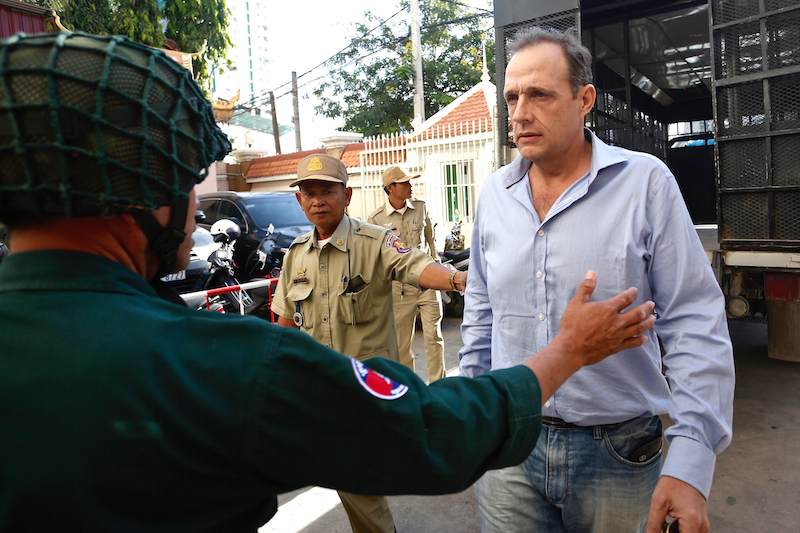A British entrepreneur, three of his associates, a military general and a lawyer were handed prison sentences of between three and nine years on Wednesday at the conclusion of a fraud trial with more than 100 hearings that had lasted over two years.
Gregg Fryett and his employees—Cambodian-Americans Um Sam Ang and Soeun Denny, and Cambodian Ouk Keo Ratanak—were handed five- to eight-year prison sentences by Presiding Judge Chuon Sokreasey for a string of charges associated with a failed jatropha plantation in Banteay Meanchey province.

Hanh Chamrong, a military general who negotiated land deals for Mr. Fryett’s company, International Green Energy (IGE), was sentenced to nine years in prison and fined 10 million riel, or about $2,500, while Ty Pov, a lawyer who helped process the land documents, received a three-year sentence and was also fined 10 million riel.
Mr. Sokreasey convicted the men in absentia and issued an arrest warrant for General Chamrong, but not for Mr. Pov, a decision he said was made at the court’s discretion.
He also fined IGE 100 million riel, or about $25,000, and ordered the confiscation of its heavy machinery, including two excavators, four bulldozers, seven trucks and 18 tractors.
Appearing briefly, Judge Sokreasey refrained from reading out the reasoning for the court’s decision, because the report had “a lot of pages,” instead announcing the sentences before swiftly retreating from the bench.
Mr. Fryett received an eight-year sentence and a fine of 10 million riel; Mr. Sam Ang received a seven-year sentence and a 10 million riel fine; while Mr. Denny and Mr. Ratanak both received five-year sentences and fines of 5 million riel, or about $1,250.
The four defendants were arrested in 2013 on charges of falsifying documents to purchase land for the jatropha plantation and biofuel operation, defrauding farmers and illegally clearing land.
They have repeatedly denied the charges, and Mr. Fryett has argued the litigation is illegal due to its reliance on evidence collected during an investigation led by Ang Mealaktei, the disgraced former director of the Banteay Meanchey and Phnom Penh courts, who was convicted of unlawful exploitation earlier this year for gifting a drug dealer’s seized SUV to his son.
Mr. Fryett and two of his co-defendants smoked cigars and drank coffee in the men’s restroom at the court prior to hearing the verdict, which was delivered under the gaze of five officials from the Anti-Corruption Unit (ACU), including one man who photographed and videotaped the proceedings.
Mr. Fryett said he would appeal the ruling, though he was “not surprised” by the outcome.
“They didn’t follow the law. They didn’t bring the witnesses. They didn’t have a legal prosecution, and we know all they want is money,” he said. “It is reasonable to say that yes, I probably will [appeal],” he added. “Whaddya reckon? If you were a betting person, how much? It’s a safe bet. In fact, we’re going to file these lawsuits now.”
On Tuesday, Mr. Fryett’s translator filed an injunction to the Court of Appeal seeking to delay Wednesday’s judgment and prompt an investigation into the Phnom Penh Municipal Court and ACU based on allegations that officials had been “demanding a ransom.”
“We are aware that the court and ACU are demanding said ransom money because we have had ongoing discussions with them to pay this ransom,” Mr. Fryett said in an email addressed to U.K. parliamentarians and the U.S. and E.U. embassies in Phnom Penh.
“It is clear that all domestic specific remedies have been sought and it is now the intention of the defense to fast-track a complaint to the [International Criminal Court] and [International Court of Justice] as directed by counsel,” he said.
Speaking outside the courtroom, Mr. Sam Ang, Mr. Fryett’s employee, decried the verdict and said he would also appeal.
“This sentence is absolutely unacceptable because we did not commit [the charges],” he said. “Everything is just accusations made by Ang Mealaktei, and Ang Mealaktei was the root cause.”
Sok Sam Oeun, the lawyer for Mr. Sam Ang and Mr. Denny, said Cambodian judges were hesitant to acquit defendants who had spent considerable lengths in prison out of fear they would be criticized or forced to explain themselves.
“If they are found not guilty, there would be people that say they were unfairly imprisoned for four years and who is going to repay them? This is the problem,” Mr. Sam Oeun said.
“This reaction could pressure the judges, who dare not release defendants by acquittal.”
Mr. Sam Oeun said such outcomes could be avoided by granting bail or limiting the length of provisional detention in cases of non-violent crimes. Such requests were repeatedly rejected by the municipal court and Appeal Court.
ACU chairman Om Yentieng said his agency would reinvestigate the case if the Appeal Court instructed it to do so.
“If the investigating chamber required me to investigate this case again, I will,” he said.
Chhum Socheat, a Defense Ministry spokesman, said he was unaware of the case, but that Gen. Chamrong would not be protected from the law.
“When the court issues an arrest warrant, we have to follow,” he said. “No matter what rank he was when he did wrong, he will be arrested.”
(Additional reporting by Sonia Kohlbacher)



